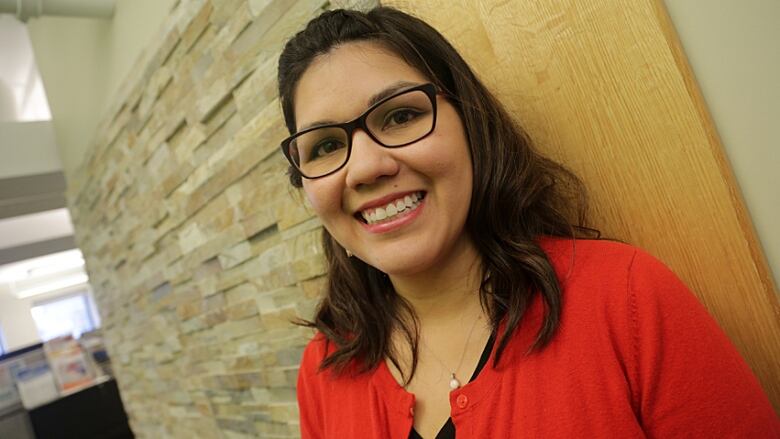City launches new strategy to improve supports for urban Indigenous people
The city doesn't know what the strategy will look like yet, but it's hired Shylo Elmayan to do the work

More than 15,000 Hamiltonians are of Indigenous descent, and many suffer unique challenges with finding jobs, with access to education, with poverty in general.
Now Shylo Elmayan is tasked with figuring out exactly how to bridge the gap between the city and its Indigenous population, including addressing how to provide supports to those members of the community who need them.
It's about letting people be heard.- ShyloElmayan
Elmayan, who isAnishnawbe and raised on Hamilton Mountain,will spend the next year and a half working on the city's first urban Indigenous strategy. It's an effort aimed at better linking the city with the estimated 15,084 people of Indigenous descent who live here.
It's early in the 18-month process. Elmayan isn't sure what exactly that strategy will look like yet, or what it will entail. But she knows what she wants it to achieve a city that reaches out more to its Indigenous people, andoffers better services.
"There's a recognition and an understanding that a strong relationship with Indigenous people is important in Hamilton," she said.
With the strategy, "we want to make bigger strides."
Indigenous people make up about 3.1 per cent of Hamilton's population. And while many don't live in poverty, or lack access to education and jobs, a disproportionate number of them do.
A 2015 report from the Social Planning and Research Council of Hamilton, for example, shows a population with less access to education and employment.
For example, 29 per cent of Hamilton's Aboriginal residents live in poverty, the report shows. That's compared to 16 per cent of non-Aboriginal residents. That's also higher than Aboriginal people in Ontario (24 per cent).
Among local Aboriginal residents aged 25 to 64, the report says, nearly a quarter haven't finished high school. That's compared to 13 per cent of non-Indigenous Hamiltonians.
'It's about letting people be heard'
As for post-secondary education, 62 per cent of Hamilton's general population has finished some post-secondary education, compared to 53 per cent of Indigenous people.
Aidan Johnson, the Ward 1 councillor who pushed for the strategy, hopes some of those questions are answered. He doesn't know what form this strategy will take yet either, but like Elmayan, he has goals.
Both say the strategy will involve meeting with as many Indigenous people, and the organizations that serve them, as possible. They want to find out what's needed first.
"It's about letting people be heard," Elmayan said. "I hope to reach out to as many people as possible."
Elmayan has experience doing that. She's served as a senior manager of First Nations and Metis relations with Hydro One. She led public consultations on transmission and maintenance projects there.
'The role city government needs to play in the decolonizing process'
She's also been a policy advisor with the Ontario Ministry of Aboriginal Affairs, and a program co-ordinator and tenant rights advocate with Aboriginal Legal Services of Toronto. Most recently, she worked at McMaster University, where among other tasks, she advised on equitable hiring practices and conducted equity workshops and seminars.
Johnson sees the strategy as an extension to some of the recommendations of the Truth and Reconciliation Commission.
"We need to have a conversation as a city about the role city government needs to play in the decolonizing process," he said. "That's one of the primary aims of the initiative."
Money for the strategy so far has come from the city's emergency and community services budget. Johnson also hopes some of the mayor's $50 million poverty initiative goes to the strategy too.












_(720p).jpg)


 OFFICIAL HD MUSIC VIDEO.jpg)
.jpg)



























































































